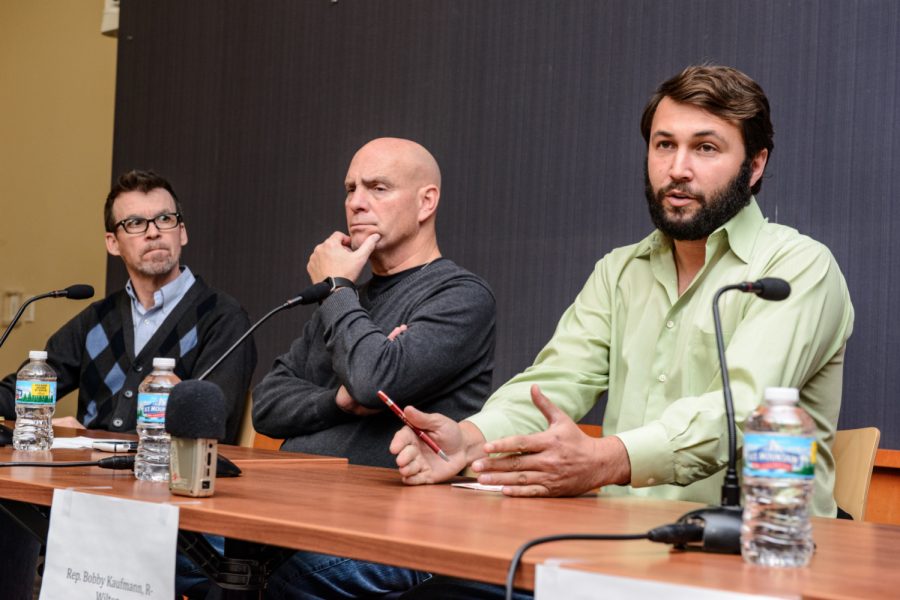Jaimes: IPERS: Iowa Democrats’ favorite scare tactic
Debate over Senate File 634 has revisited a never-ending uproar about the future of IPERS.
Rep. Bobby Kaufmann, R-Wilton, speaks during the Eastern Iowa Legislator Forum at the Iowa City Public Library on Wednesday, Dec. 5, 2018. The event, hosted by The Daily Iowan Ethics and Politics Initiative and Iowa Watch, featured a panel of five eastern Iowa state legislators.
April 28, 2019
Founded in 1953, the Iowa Public Employees Retirement System has allowed public-sector workers to retire with a sense of safety, giving benefits amounting to more than $2 billion to its members. The system is also the preferred method of fearmongering for the Iowa Democratic Party.
Members of the Iowa House worked into the late hours of the night last week, voting in favor of increasing transparency in raising property taxes. The Iowa Senate had previously voted in favor of the bill, now sending it to Gov. Kim Reynolds’ desk for the final stamp of approval.
The bill, Senate File 634, would require city councils and county boards to be held accountable when raising property taxes. It asks that boards and councils hold public hearings when planning to increase property-tax revenues by means of higher tax rates or through increased property-value assessments should a city’s tax revenue increase by more than 2 percent. Two-thirds of city councilors would have to vote in favor of the boost if that is the case.
RELATED: Kaufmann: ‘Zero, nada, zilch’ support for changes to state employee retirement rules in 2019 session
Opponents of the bill claim it pits public employees against essential services by capping budgets, which includes funding for public-employee health insurance for cities and counties, directly competing with IPERS.
Upon debate of the bill, Rep. Chris Hall, D-Sioux City, tweeted that Iowa Republicans are “kneecapping pensions for public employees, police and fire after making EXPLICIT promises not to do so.” He cited Reynolds and Rep. Bobby Kaufmann, R-Wilton, as Republicans who vowed not to change the system.
Tonight could go down as the most politically damaging debate taken up by the @IowaGOP in recent years. They are knee capping pensions for public employees, police and fire after making EXPLICIT promises not to do so. pic.twitter.com/3PRtGDn0jq
— Rep. Chris Hall (@HallForIowa) April 25, 2019
At a December 2018 legislative forum hosted by The Daily Iowan, Kaufmann, chair of the House State Government Committee, definitively stated there would be no changes to IPERS under his leadership: “There will be zero IPERS bills, period. End of story. End of discussion. No tweaks, no changes.” Months later, accusations of revising IPERS are still at hand.
Iowa House Democrats also touched on the matter, tweeting that SF 634 would put “Iowa’s retirement security in danger.”
#IAGOP have been telling Iowans that they won’t touch #IPERS or 411. THEY LIED. Iowans’ retirement security is in danger. We are debating SF 634 now and fighting through the night. #handsoffmyipers #ialegis https://t.co/c2U7J30enz
— Iowa House Democrats (@iowahousedems) April 25, 2019
Rep. Monica Kurth, D-Davenport, argued on the House floor that “Iowans should know that this bill, SF 634, hurts communities, puts IPERS, and 411 in danger and does not lower property taxes.”
A statement IPERS released quashed all debate about the scandal: “This bill does not affect a member’s or retiree’s pension.”
Regarding recently passed property tax bill, SF 634: This bill does not alter the employers’ obligation to pay the employer portion of IPERS’ contributions as established annually under Iowa Code Section 97B.11. This bill does not affect a member’s or retiree’s pension.
— IPERS (@IPERSinfo) April 25, 2019
It is clear that the lives of retirees are only a talking point to Iowa Democrats, who now have to respect IPERS as the final authority on itself. In the 2018 midterm elections, IPERS was a recurring topic, with Democrats instilling fear in retirees, the most reliable class of voters.
Overall, SF 634 would increase transparency in local governments. Government officials will now have to answer to their constituents and make a solid case on why their property taxes should increase.
Anyone fighting against accountability in local government under the guise of retiree pensions should think twice about what they prioritize: their constituents or a partisan agenda.






